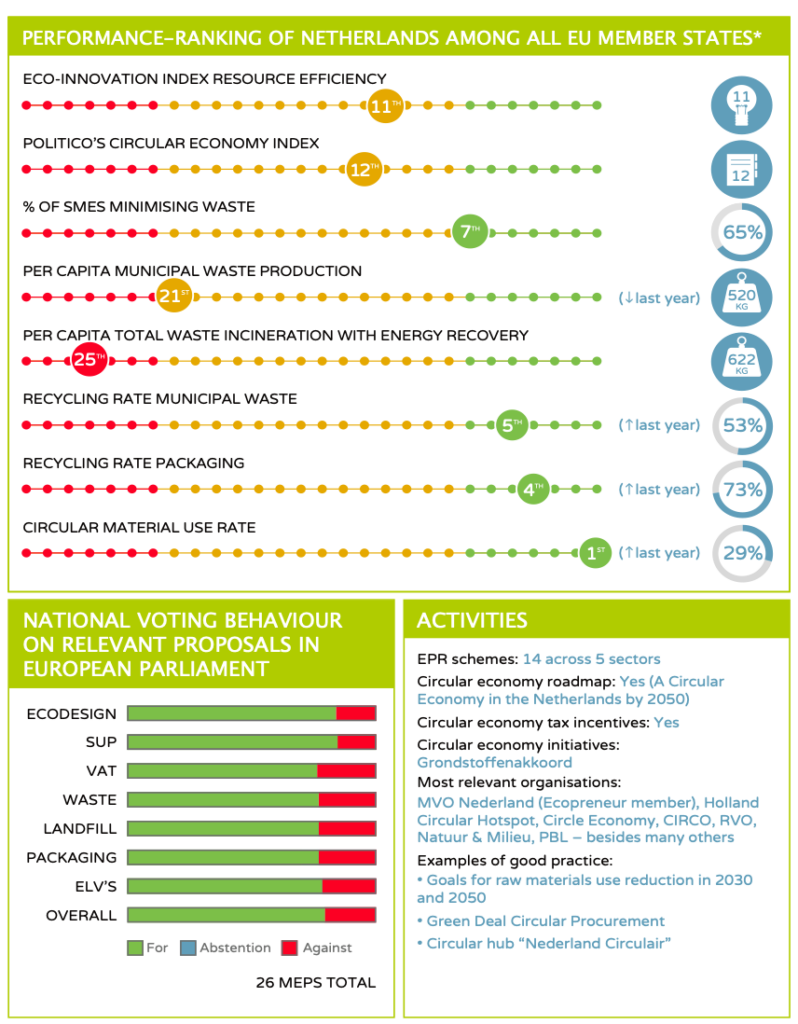3 Best practices from The Netherlands for a European Circular Economy
November 18, 2019
Arthur ten Wolde is the executive director of Ecopreneur.eu, the European Sustainable Business Federation. Ecopreneur represents about 3000 businesses in six member states, mostly SMEs, which strive to deliver sustainable products and services. Arthur is internationally recognized as a circular economy expert, motivational speaker and (co-) author of several reports and numerous articles in magazines.
In addition, he is a member of the European Circular Economy Stakeholder Platform (ECESP) Coordination Group, of the Ecodesign and Energy Labelling Consultation Forum (EELCF) and a Technical Expert Group on Sustainable Finance of the European Commission, the EU policy expert for MVO Nederland, Trainer Circular Design for CIRCO, and Head and Owner of Circular Future. Arthur worked earlier for De Groene Zaak, IMSA, and the Dutch Industry Confederation VNO-NCW.
Arthur’s profile: https://www.linkedin.com/in/arthurtenwolde/
Ecopreneur: www.ecopreneur.eu
Disclaimer: Holland Circular Hotspot publishes opinions on CE from a wide range of perspectives in hopes of promoting constructive debate about consequential questions about Circular Economy.

Becoming a fully circular economy: 3 best practices from The Netherlands
The Netherlands has been at the forefront of the circular economy in Europe – and globally – since the beginning of the movement around 2012. It is therefore fortunate that the European Environment Council and the new European Commission have recently confirmed that the circular economy will remain a top priority (for real!), with a Circular Economy Action Plan 2.0 linked to European Green Deal and climate policy [1], and specific attention to textiles [2]. Fortunate is also that climate policy has risen to the top of the European policy agenda, due to rapidly grown concerns of European citizens in all member states for the impacts of climate change. Given that about 50% of all greenhouse gas emissions is related to products and materials, realising the international climate goals can only be achieved by creating a circular economy.
These recent developments give hope that the high speed of introducing new legislation can be continued during the next five years. That is important to implement regulations that will actually improve the business environment for green SMEs and pioneering companies to introduce circular products and services, by moving further beyond waste management. For instance, by implementing Green Deals for Circular Procurement at the EU level and in all member states. Also, by implementing extended producer responsibility (EPR) schemes for packaging including eco-modulation of fees in all member states, and issuing clear and ambitious EU guidelines for EPR in general. Even more important, by adopting the forelying VAT rate proposal from the European Parliament, which would clear the way for low VAT rates for circular products and services. Each of these measures would strongly drive the demand for circular, the lack of which is the main obstacle for switching from linear to circular business models at the company level. And finally, the European Union should further integrate resource efficiency in ecodesign directive to ban the worst products from the EU internal market.
Coming back to how the Netherlands is progressing, by 2019, there is a multitude of initiatives too vast to cover comprehensively. The PBL institute estimates a total of about 85,000 activities involving 420,000 jobs that contribute to the circular economy, out of which about 1,500 innovative initiatives. In addition, a recent report from Ecopreneur.eu with an overview of circular economy in all 28 European member states shows very respectable rankings for the Netherlands in the majority of circular economy performance indicators. [1] Year-over-year the country has improved in per capita waste production, recycling rate of both municipal waste and packaging, and circular material use rate. The circular material use rate is indeed particularly impressive for the Netherlands, coming in first with a total of 29%, far above Belgium as the second ranking country with a rate of 21%. For more details see figure 1 below.
Extended Producer Responsibility, a crucial economic incentive to foster the circular economy, is well catered for with a total of 14 schemes covering 5 sectors. Within the abundance of circular economy initiatives, there are three that stand out as international best practices:
- The national strategy document “A circular economy in the Netherlands by 2050” developed and published by the Ministry of Infrastructure and Water Management and the Ministry of Economic Affairs in 2016 is one of the most recognised. Setting an example, the programme establishes measures aimed at developing a circular economy in the Netherlands by 2050 including: the objective to reduce the use of primary raw materials by 50 per cent in 2030 and become 100 per cent circular in 2050, unifying policy on an international level, interventions (legislation and regulations), waste as a raw material, smart design, conscious use, extending product life and various others. The fact that no one at this time can tell exactly what “100% circular” means or how to reduce the use of virgin raw materials, reduces nothing of the powerful impact of these long-term objectives on policy making and monitoring exercises.

Figure 1. Performance ranking of the Netherlands among all 28 EU Member states. Source: Ecopreneur.eu, 2019 [1]. For further explanation of the indicators and references for statements in this article see this report.
- Next, the Netherlands was the first to introduce Green Deal Circular Procurement, an initiative that fosters collaboration between organisations and encourages the purchase of circular goods and services invoking over € 100 million in procurement done circular, and which has since been copied by Belgium, Finland and Paris.
- Finally, the ‘Nederland Circulair’ programme managed by Ecopreneur member MVO Nederland is regarded as an example of good practice of a circular hub and a public-private partnership.
Ecopreneur.eu recommends all nations to follow these examples and ‘copy with pride’ while taking into account national and cultural differences.
And that is not all. The EPR scheme for packaging recently introduced an eco-modulated fee on the basis of recyclability by offering a low tariff for plastic packaging with a positive market value that can be well sorted and recycled, as well as for certain drink cartons, while the low fee for biodegradable plastic packaging was cancelled because they remain present in current composting installations. The latter is a step back for biodegradable plastic packaging, but forms an adequate response to the current situation in terms of waste management.
In line with the EU VAT directive, the Netherlands also offers VAT reduction on minor repair services, particularly for bicycles, shoes and leather goods and on second hand goods. In 2017 more than 80 organisations including the government, MVO Nederland and industry federation VNO-NCW signed the Resource covenant (Grondstoffenakkoord) with commitments contributing to the national circular economy strategy. Finally, in February 2019 the government launched the Acceleration House (Versnellingshuis) as a joined initiative to implement the Resource covenant. Recently, the government has initiated actions on circular textile policies that show a promise of moving the Netherlands to the international forefront of policy making. Including the Dutch Circular Textiles Valley and EPR for textiles. Finally, the country’s voting behaviour towards circular economy proposals put forward by the EU commission is positive, but resistance against EU proposals is also clearly visible.
All in all, the Netherlands is right on track to becoming a fully circular economy, although this will not come without its challenges. Similar to other wealthy nations, the per capita waste production is high with a total of 520 kg per year. Moreover, the performance on renewable energy is trailing behind in the EU with a share of only 6.6 per cent, ranking 27th in the EU before Luxemburg only. Barriers to achieving a circular economy are generic and probably present in all member states, such as counteracting regulations, lack of commitment from value chain partners and a lack of access to funding. Additionally, companies are finding it difficult to form a specific strategy to become circular and circular entrepreneurship is often still based on existing revenue models. The Netherlands is only at the beginning of unleashing the potential of the circular economy.
Ecopreneur.eu therefore has the following recommendations for the Dutch government:
- Expand the leading role in the implementation of the Acceleration House to the other ministries to keep the Dutch circular economy ‘hub’ in the international forefront – other countries are rapidly catching up!
- Ensure long term budget for the circular economy programme connected to the Acceleration House and the Resource covenant, including sufficient process budget for assisting companies and municipalities with setting up cross-sectoral collaboration and setting up new circular value chains.
- Building on the Circular Procurement Academy and the Green Deal Circular Procurement 2.0, launch a massive training programme for both the public and the private sector, and set and monitor ambitious circular procurement targets.
- Evaluate the existing EPR schemes based on the latest recommendations of the OECD191, EY and Ecopreneur.eu as a basis for improvement, and extend them to cover more sectors and eco-modulation of fees.
- Introduce tax incentives such as low VAT rates for transactions with clearly defined social reasons, discuss the EU VAT rate proposal in the context of the circular economy and issue a study on the possibilities for positive price incentives for circular products and services via VAT differentiation or other tax measures.
- Further apply the waste hierarchy by stimulating waste prevention by design, sharing, maintenance, repair and reuse before recycling.
- To enable a next step in the transition, include or even prioritise the circular economy in existing business and industry policies, including the areas of innovation, procurement, financing, and international trade.
- Integrate circular economy in curricula across the education field, from high school to university.
Moreover, the EU has a crucial role to play to further accelerate the circular economy in Europe. First, in addition to what was already mentioned before, by stepping up market surveillance. Without this, we can create new laws but these will not lead to a circular economy in Europe. Second, by playing an active role to introduce a tax shift from labour to resources. Innovations in taxation are a crucial next step: without price incentives making circular options cheaper and linear ones more expensive, the circular economy will not be realised. The need for a tax shift has recently become more apparent, for instance from the impossibility in various countries to introduce fuel tax increases without simultaneously compensating labour taxes – leading to loud protests and the withdrawal of necessary measures. While a national responsibility, the only way forward seems to form a coalition of countries willing to actually introduce tax shifts and work together at the EU level to develop and align functional approaches. With a tax reform exercise planned for the Netherlands in 2020, I hope that the Dutch government can play an active role in this process to create a circular level playing field in Europe.
Finally, Ecopreneur.eu has become known as the political voice of green SMEs in Europe over the past four years. We represent about 3000 companies in six member states, including about 100 larger companies. Of these 3000, only six companies are actively supporting our advocacy towards a sustainable economy via the Ecopreneur.eu Circular Economy Advocacy Group: Tarkett, Werner & Mertz, ROCKWOOL, Interface, REMONDIS and HUMANA Kleidersammlung. To further step up our advocacy work and accelerate the transition, green companies from all sectors and member states are more than welcome to join!
Arthur ten Wolde is director of Ecopreneur.eu, Expert EU Policies for MVO Nederland and CIRCO Trainer.
For more information see www.ecopreneur.eu
Literature
[1] Ecopreneur.eu. (2019). Meeting the Climate Goals requires strong circular economy policies, September 2019, available at https://ecopreneur.eu/wp-content/uploads/2019/09/EcopreneurEU-Climate-and-CE-paper-2019.pdf
[2] Ecopreneur.eu. (2019). Circular Fashion Advocacy, A strategy towards a circular fashion industry in Europe, available at https://ecopreneur.eu/wp-content/uploads/2019/03/EcoP-Circular-Fashion-Advocacy-Report-28-3-19.pdf
[3] Ecopreneur.eu. (2019). Circular Economy Update – overview of circular economy in Europe, September 2019, available at https://ecopreneur.eu/wp-content/uploads/2019/09/Ecopreneur-Circular-Economy-Update-report-2019.pdf
